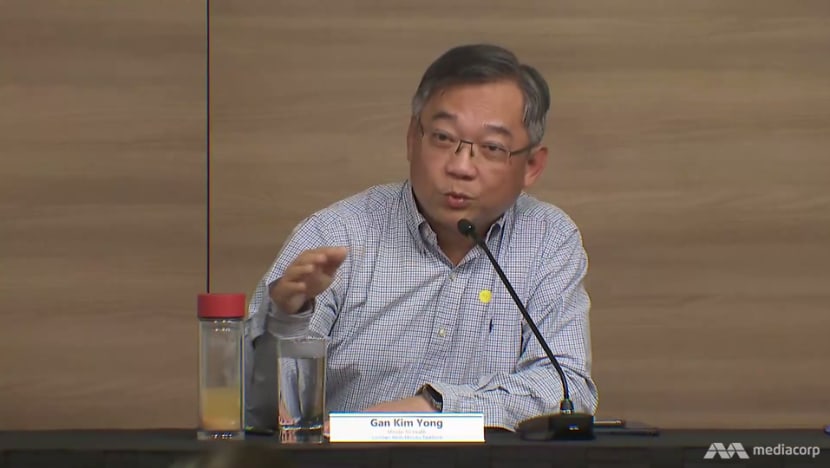commentary Commentary
Commentary: COVID-19 - time for businesses and workers to have the guts to embrace the new normal
Companies should focus on what it would take to build enduring business models and HR practices, while workers should be more open-minded about other forms of work, says PeopleSearch’s Jaime Lim.

(Photo: Unsplash/Stefan Stefancik)
SINGAPORE: Over a cup of coffee recently, a friend of mine, under pressure because of the beating his business is taking amid the COVID-19 outbreak, unleashed a torrent of worries and frustrations.
Given the fluidity of the situation, he and his team were struggling to cope with fresh uncertainties of how the business would operate.
It eventually dawned on him that, crisis or no crisis, surviving in a VUCA (volatile, uncertain, complex and ambiguous) world has been the norm for several years now. In fact, the term has been bandied about in business circles since the early 2000s.
READ: Commentary: SMEs welcomed support from Budget 2020. Of course they all would
LISTEN: Singapore Budget 2020: A report card, a Heart of the Matter podcast
CRISIS – THE BEST TIME TO 'GET WITH THE PROGRAMME'
Still, a sense of short-termism perpetuates the measures many firms take to survive today. It’s akin to suffering from intermittent amnesia.
We only remember the pain when the next crisis arrives and forget it soon after it abates, leaving us unprepared for an increasingly unpredictable world.
Since COVID-19 emerged, members of the Government have been urging both businesses and workers to use the lull to improve their business models and skills to prepare for an eventual recovery.
Singapore “must expect to see significantly higher numbers" of new COVID-19 cases in time to come, Minister for Health Gan Kim Yong said in Parliament on Thursday (Mar 5).
“It is likely this disease will stay with us for a long time and we will have continuously adjust, fine-tune, our measures to deal with the disease so that life can go on while appropriate precautions are put in place,” he added.

This indeed might be the best time for businesses to reflect and workers to reboot. While you put out fires, consider what it would take to build enduring structures and approaches so that life can go on.
BEYOND SALARY CUTS, FREEZES AND RETRENCHMENTS – A NUANCED HR AUDIT
A study by management consultancy, Bain, based on data from the global financial crisis showed that the top 10 per cent of companies saw their earnings climb steadily throughout the period and continue to rise afterward.
The differentiator was preparation. In addition to digital transformation, a key element of this was workforce management.
As a recruiter, I’m well aware that while many firms are cutting jobs, others believe a combination of salary cuts and freezes would serve them better.
This is understandable as retrenchments can be costly for companies. Ultimately, rehiring and training when the economy picks up could set you back a sizeable amount. The Society for Human Resource Management states that generally, it could cost up to 50 per cent of an employee’s annual salary to find a direct replacement.
READ: Commentary: The biggest work-from-home exercise may have just begun. How ready is Singapore?
READ: Commentary: Sometimes, a promotion isn’t all that great
But if you choose to keep employees and institute interim coping measures, you need to be discerning. This is the time to do a human resources audit.
Only keep those who are likely to be valuable to your success and longevity. Ask yourself, do they have a spirit of learning? Do they have a spirit of adaptability and experimentation needed to succeed in an uncertain business climate?
Strategic retrenchments should give you more latitude to engage in strategic hiring during a crisis.
As you consider the elements you need to survive and to recover sustainably, skills gaps within your organisation might become more apparent. Think about the types of people you’ll need to assist in your transformation and longevity.

During the Asian financial crisis in the late 1990s, Fortune 500 firm, Emerson, an automation solutions provider took a contrarian approach and ramped up its investments in research and development and production in Thailand.
By the time the crisis ended, it had secured a strong position for itself in Asia. Among the vital steps Emerson took was to gradually add manpower across its business in Asia and elsewhere to prepare for and maintain growth.
Emerson succeeded partly because it had built contingency planning into its culture and was able to strengthen its core business by taking advantage of the fact that its competitors were in withdrawal mode during the recession.
What do you do if, at this point, you don’t have this advantage? Some of our clients are considering different hiring models, for example, contract jobs with the promise of a bonus upon recovery. The recovery threshold that would qualify an employee for a bonus is clearly stated in the contract.
Also, factor the Government’s jobs and salary support packages into your decision-making process.
READ: Commentary: Budget 2020 shows old medicine can soothe symptoms but won’t be enough for businesses
READ: Commentary: Career Mobility is the new Career Stability
DUMP TRADITIONAL HIRING METRICS
Although some firms have delayed or even halted hiring, many of our clients are pressing on, with an eye on their future business prospects.
Some fervently apply VUCA principles to their hiring process. For example, during job interviews, they ask questions designed to assess whether a candidate is able to spearhead experimentation that could help the company deal with “unknowns, unknowns”.
Unfortunately, others choose to stick to traditional hiring metrics such as the schools candidates attended and grades, even in the face of a growing body of research showing that grades are not an accurate predictor of success.

In fact, as early as 1971, a study by the Harvard Business School suggested that grades do not determine a person’s efficacy at the workplace. Research suggests that even a candidate’s years of experience can be a poor predictor since operating environments are volatile and past experience can easily become obsolete.
Instead, test for a candidate’s degree of self-motivation and ability to adapt and learn. A range of psychometric tools can help you do this.
DUMP AGEISM
Recent reports have again highlighted the issues facing candidates above 40 with many being stereotyped as unadaptable.
If you have a mindset that they “tend to be a certain way”, you’ll lose out on the many who are not “a certain way”.
Global HR Research analyst and founder of Bersin by Deloitte, Josh Bersin often cites research showing that “raw mental horsepower declines after the age of 30, but knowledge and expertise — the main predictors of job performance — continue increasing even beyond the age of 80”.
READ: Commentary: Commentary: Don’t waste Budget money. Here’s how to stretch your SkillsFuture dollars
He also cites growing evidence that drive and curiosity accelerate new skills acquisition, even during late adulthood, that “when it comes to learning new things, there is just no age limit”.
In our experience, the Government’s efforts to encourage upskilling and adaptability among older jobseekers have paid off. More than 50 per cent of our older candidates have a track record of keeping up with industry trends and acquiring the skills necessary.
But they have also reported that in spite of being willing to adjust their salary expectations, employers assume that they will leave as soon as they find a job that offers more money.

How can you objectively assess their intentions?
We recommend a closer look at their employment history and what motivated each move. Does it appear as if every move was motivated by a healthy pay bump? If not, give them the benefit of the doubt when they say they are willing to accept a pay cut.
Respectfully asking probing questions about their family background and financial commitments during the second or third-round interview would help as well, enabling you to assess if what you’re offering would be sufficient.
READ: Commentary: Better job matching? Employers should note these top 5 recruitment mistakes first
JOBSEEKERS NEED TO BE OPEN TO DIFFERENT MODELS OF WORK
On other fronts, jobseekers, both young and old, need to manage their expectations.
While a bad economy inevitably results in many companies freezing hiring, those that continue to hire may offer short-term contracts.
In our experience, many jobseekers turn away such contracts, choosing to hold out for something long-term that may or may not come.
But among the candidates we manage, up to 40 per cent on short-term contracts end up being offered contract extensions or permanent contracts, whether within the same company or other companies, within a month.
READ: Commentary: Do not fear retrenchment. Four tips for working professionals in a downturn
Our clients routinely say that when assessing CVs, short-term work experience beats a complete lull.
Upheaval and uncertainty instinctively lead many down a path of despondency. But let’s not succumb to this.
Let’s finally have the guts to accept this as the new normal and build robust mindsets and systems that will imbue us with a sense of comfort in an increasingly uncomfortable world.
Jaime Lim is Group Business Leader of PeopleSearch, an executive search firm with a presence in six cities including Singapore.















